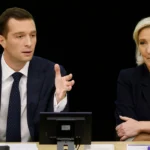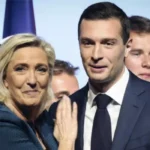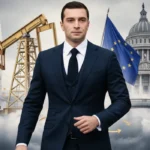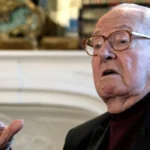On track for a new mandate? The leaders of the 27 member countries of the European Union are expected to agree on Thursday to support a second term for Ursula von der Leyen as head of the European Commission, at a summit held three days before the French elections with unprecedented stakes.
The hypothesis of the far right coming to power in the second economic power of the European Union will be on everyone’s mind in Brussels, where the heads of state and government are meeting early this afternoon to distribute key EU positions, in the wake of the European elections.
The die seems cast on these “top jobs” after the agreement reached on Tuesday between six European leaders – including the French Emmanuel Macron and the German Olaf Scholz – belonging to the “grand coalition” of the right, social democrats and centrists.
Giorgia Meloni denounces an “oligarchy”
The agreement concerns a second term for the German, Ursula von der Leyen, as president of the European Commission, the appointment of the Portuguese socialist, Antonio Costa, as head of the European Council, and the centrist Kaja Kallas, Estonian Prime Minister, as head of diplomacy.
These names will be submitted to all the leaders gathered at the summit, who should approve them: the overwhelming majority of them belong to one of these three families (right, center, social democrats), which themselves form a majority.
A consensus had already emerged on these three personalities during an informal summit on June 17. “We do not expect there to be problems,” said a diplomatic source, summarizing a feeling widely shared in Brussels.
The summit is scheduled to last until Friday, but it could end before. The leaders are keen to reach a decision quickly, given the “uncertainty” of the electoral deadlines in France in particular, according to a diplomat.
Progress of the far right in the European elections
The European elections of June 9 were marked by a progression of the radical and extreme right, in particular the ECR group of Giorgia Meloni, which took third place from the centrist family of Emmanuel Macron in the European Parliament. The Italian leader, like the Hungarian nationalist Prime Minister Viktor Orban, is demanding that the distribution of senior posts in the EU take this surge into account.
“There is a political reality following the European elections which is that of the renewal of the coalition between the EPP (right), S&D (social democrats) and Renew (center), a coalition to which ECR does not belong,” they respond in Paris.
But “no one is excluded,” adds this source at the French presidency, emphasizing that contacts are taking place with Giorgia Meloni. Emmanuel Macron also received Viktor Orban on Wednesday in Paris.
Rome intends to have more influence
Having emerged stronger from this election, the leader of the EU’s third-largest economy intends to have more influence on the choices of the future executive in Brussels. Rome is demanding “at the very least” a vice-presidency of the European Commission, with an “important portfolio” to influence industrial and agricultural policy.
If she is indeed chosen by the leaders, Ursula von der Leyen will still have to be approved by an absolute majority of 361 MEPs. The vote could take place on 18 July during the first plenary session of the new Parliament. In 2019, she was narrowly elected, with a 9-vote lead.
The Maltese Roberta Metsola, from the EPP like Ms von der Leyen, seems assured of being re-elected as head of the European Parliament.
Zelensky on a trip to Brussels
In addition to appointing the European cast, the summit will also be an opportunity to sign an agreement with Ukrainian President Volodymyr Zelensky, who is traveling to Brussels, on the EU’s “security commitments” to Kiev.
The EU affirms its determination to “continue to support Ukraine and its people on the political, financial, economic, humanitarian, military and diplomatic levels for as long as necessary and as intensely as necessary,” according to a draft text seen by AFP.
The leaders will also try to overcome the blockage of Viktor Orban, Moscow’s closest ally within the EU, to military aid to Kiev totaling some €6.6 billion.
They should also endorse the “strategic agenda” setting the bloc’s priorities for the next five years. It focuses on security, defense, competitiveness and the fight against illegal immigration in particular.
This article is originally published on latribune.fr






